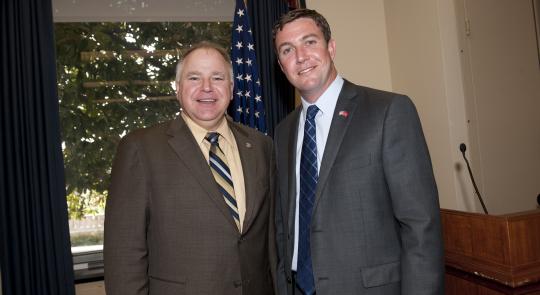The Military Coalition (TMC) is a group of over 30 military and veterans organizations that work together on issues of common concern. Last Wednesday the Guard-Reserve Committee sponsored the annual House (of Representatives) Guard-Reserve Caucus breakfast. The purpose of this event is to bring together the leaders of each of the Reserve Components of the U.S. Armed Forces with members of the Guard-Reserve Caucus of the House of Representatives and allow the Reserve Component Chiefs to let the House members know what their top 3 needs for the coming year are.
The co-chairs of the House Guard-Reserve Caucus are Rep. Duncan Hunter (R-Calif.) and Rep. Tim Walz (D-Minn.), with Hunter having been a Marine Reservist and Walz being an Army National Guard retiree (and EANGUS Member). They were the co-hosts of the breakfast.
The guest speaker was acting Deputy Secretary of Defense Christine Fox. Ms Fox explained and defended the Department’s proposed budget for the 2015 fiscal year. In her address, Ms Fox repeated the Department’s complaint about Sequestration (the automatic spending cuts to United States federal government spending in particular categories of outlays that were initially set to begin on January 1, 2013). Although Congress partially restored funding to DoD last year, more automatic cuts are scheduled to go into effect in coming years and she stated that the proposed cuts this year are nothing compared to what the cuts will have to be in coming years if Sequestration is not changed. A number of the Reserve Component Chiefs echoed her complaint about Sequestration.
However, later in the event, when Rep. Hunter had a moment to speak, he pushed back against Secretary Fox and the Chiefs and told them that Sequestration was a fact of life, was not going to be repealed, and that they needed to get used to it and plan accordingly. In addition, the split between the active Army and the National Guard was publicly displayed when GEN Frank Grass, the Chief of the National Guard Bureau and a sitting and voting member of the Joint Chiefs of Staff, spoke in favor of appointing a new commission to settle the differences between the active Army and the National Guard regarding the size and structure of the Army and its Reserve Components – something the active Army is strongly opposed to.
All in all, it was one of the most interesting breakfast meetings the Guard-Reserve Committee has ever hosted. It demonstrated publicly the fight for scarce resources that is taking place at the top levels of the Defense Department and it was fascinating to watch.


